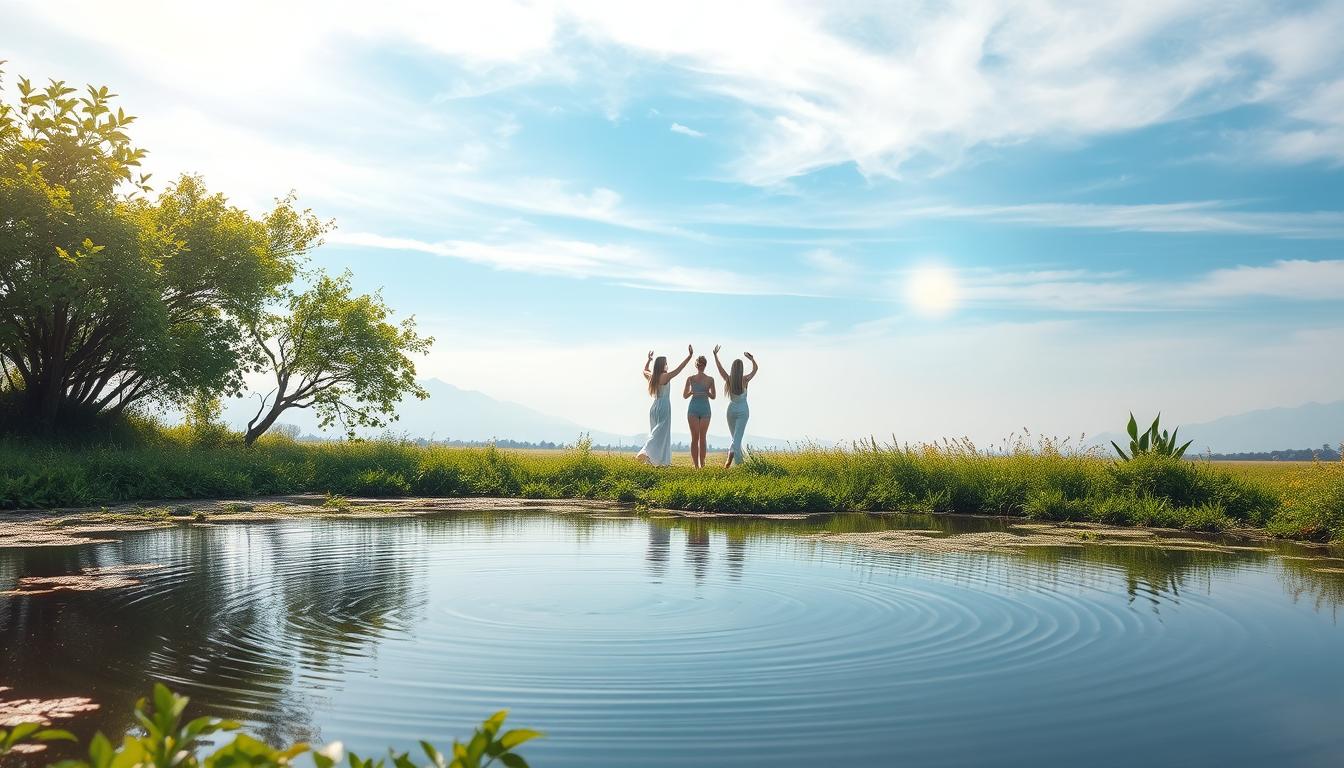In the quietest hours, when the world is silent, our hearts whisper truths we’ve ignored. We feel a longing to honor our deepest desires. For too long, guilt or fear has silenced us.
Sexual Awakening is more than just a physical awakening. It’s about finding the courage to reclaim your erotic energy. This journey invites you to meet yourself where you are, no matter what.
Imagine a world where your desires are celebrated, not shamed. Sexual Awakening is a path, not a destination. It’s where guilt turns into self-compassion and societal scripts fade away.
Every woman’s journey is unique, shaped by her history, culture, and heart. Yet, all paths share one truth. Embracing your authentic desires can bring creativity, joy, and connection.
Key Takeaways
- Sexual Awakening integrates mind, body, and spirit, transcending physical pleasure.
- Cultural stigma and trauma often block access to authentic desire, demanding intentional healing.
- Embracing your erotic energy fosters mental resilience and emotional clarity.
- Boundaries and self-compassion are pillars of this transformative journey.
- Every woman’s path is valid, whether reclaiming agency or exploring new horizons.
Understanding Sexual Awakening: A Comprehensive Overview
Sexual awakening is about finding your true self, free from what society expects. It’s a journey of exploring your desires and boundaries. It also looks at how physical and emotional health are connected.
Research shows that 70% of people feel a deep spiritual connection during intimate moments. This shows how important it is for our overall well-being.
Definition and Importance
Sexual awakening means seeing your sexuality as a natural part of who you are. Studies show that 90% of Buddhist practitioners want to talk openly about sex in spiritual settings. But, most of these conversations don’t happen.
This awakening helps us accept ourselves more. Dr. Emily Nagoski’s work shows how psychology plays a big role in our desires. Sonya Renee Taylor fights for body positivity, helping us shed shame and embrace our bodies.
Signs of Sexual Awakening
- Increased body awareness and curiosity about personal desires
- Questioning societal norms around intimacy and relationships
- Seeking ethical frameworks, like those in Laurie Mintz’s research on female anatomy
- Desire to explore mindfulness practices, such as Kundalini yoga (80% report heightened awareness)
Common Myths Debunked
Myth: Sexual awakening is only about the body. Reality: It’s about growing emotionally and spiritually too. This is seen in 75% of tantric practitioners feeling closer to others.
Myth: It’s all about me. Reality: It actually helps us feel more connected and empathetic. This is what Adrienne Maree Brown talks about in her work on pleasure activism.
Myth: It’s only for the young. Reality: People of all ages can experience it. This is shown in studies with queer and trans Buddhists feeling more embodied.
The Journey of Self-Discovery
Self-discovery starts when we look at how our bodies and desires shape us. Every touch, sensation, and fantasy tells us who we are. Research shows 60% of people feel out of touch with their sexuality. But finding this connection can lead to deep personal growth. Let’s see how:
Exploring Personal Values
Begin by asking yourself: What excites me without judgment? Try journaling with prompts like:
- What boundaries feel non-negotiable?
- How do my desires align with my core beliefs?
- What myths about “normal” sexuality limit me?
Overcoming Societal Norms
Societal pressures can hide our true selves. Studies show couples who talk openly are 70% happier. Let go of shame by:
“Your body is a terrain of pleasure—explore it without guilt”
- Identify conditioning from media or family
- Replace shame with curiosity
- Seek communities like those at ZenJump’s guides
Embracing Body Positivity
Accepting your body can open up intimacy. Practices like tantric massage and breathwork can improve connection by 65-85%. Check out this table:
| Practice | Impact |
|---|---|
| Meditation | 85% improve body connection |
| Breathwork | 78% boost intimacy |
| Kundalini sexuality | 40% more spiritual connection |
Every step toward self-acceptance brings us closer to being whole. This journey isn’t straightforward, but it’s worth it. As you explore, remember: your desires guide you.
Factors Influencing Sexual Awakening
Exploring your intimacy journey starts with understanding the mix of internal and external factors. Psychological, cultural, and relationship aspects all shape your journey to self-discovery.
Psychological Aspects
Mental health and sensory experiences greatly impact your sexual exploration. Trauma, attachment styles, or anxiety can block desire. Yet, using products like Good Clean Love’s Caribbean rose oils or edible lubricants can boost sensory connection.
Research shows 85% of women link low libido to intimacy issues. Yet, focusing on sensory experiences can change these views.
- Attachment styles (secure vs. anxious) affect comfort with vulnerability
- Stress and anxiety reduce dopamine, key to desire
- Testosterone peaks in men mornings, impacting arousal rhythms
Cultural Influences
Societal norms often control how we express sexuality. Many are forced to hide queer desires—59% of LGBTQ+ individuals knew their identity in youth, according to Pew Research. Yet, 28% discovered theirs later. Media and religious views also shape what we see as acceptable pleasure.
| Identity Realization Stage | Percentage |
|---|---|
| Puberty/Adolescence | 59% |
| 20s or Later | 28% |
| Bisexuals Identifying Later | 15% of late realizers |
Relationship Dynamics
Relationships can either help or hinder personal growth. Past relationships can leave emotional scars. Yet, current relationships need open communication to grow.
Over half of women say low desire harms relationship communication. This shows the importance of mutual understanding. Healthy relationships focus on consent and setting boundaries, aligning with personal truths.
Understanding Your Desires
Sexual exploration starts with knowing what you want. Your desires are shaped by many things, like biology and culture. It’s important to know the difference between attraction and desire.
“There’s an edgy, raw power in vulnerability. Convey your fantasies, wants, and limits confidently and clearly.”

Attraction vs. Desire: What’s the Difference?
Attraction is like a spark. Desire is the flame that keeps burning. Men and women feel desire differently, research shows.
75% of men feel spontaneous desire, while 85% of women rely on responsive or situational cues. Here’s the breakdown:
| Desire Style | Men (%) | Women (%) |
|---|---|---|
| Spontaneous | 75 | 15 |
| Responsive | 5 | 30 |
| Contextual | 20 | 55 |
Mapping Your Preferences
Your sexual preferences can change over time. Life experiences shape them. For example, research shows symmetry and scent are important in attraction, but everyone is different.
Ask yourself: Do your choices reflect your true values, or are they influenced by others?
- Identify what brings genuine pleasure
- Note patterns in your fantasies
- Challenge assumptions about “normal”
Fantasy’s Hidden Messages
Fantasies reveal deeper needs. Common themes like taboo scenarios or gender-bending often show curiosity, not a literal desire. Remember, only 33% act on their top fantasy.
Fantasies are a safe way to explore boundaries. Be curious without judgment. Listen to yourself as you explore your Sexual Awakening.
Communicating Your Needs
Talking openly is key for sexual empowerment and a good intimacy journey. Sharing what you want and what you’re not okay with builds trust. It turns problems into chances to grow closer.
When you talk openly, you build a stronger connection. You understand each other better.
“70% of women report that open conversations about sexual needs lead to stronger relationships,” according to a 2023 National Survey on Intimacy.
Importance of Open Dialogue
Studies show couples who talk openly are 68% happier. Being honest emotionally helps clear up misunderstandings. Even small talks, like what you like, can make a big difference.
Being silent can lead to unhappiness. But talking things out helps you both meet in the middle.
Techniques for Healthy Conversations
- Start with “I feel” statements: “I feel excited when…”
- Schedule talks during calm moments, not heated arguments.
- Listen actively: Repeat their points to ensure understanding (“So you’re saying…”)
Getting better at talking takes practice. Start with easy topics before moving to harder ones.
Addressing Emotional Vulnerabilities
Being scared of being rejected or hurt in the past can stop you from being honest. It’s okay to say you’re scared. Saying “This matters to me, but I’m nervous” can help you feel supported.
Getting help from a professional can also help you deal with past traumas. Building emotional safety is an ongoing process. It takes gentle effort every day.
Every time you talk, you get closer to understanding each other. Whether it’s about fantasies or boundaries, being honest makes your connection stronger. Start today. Small steps can make a big difference in how you connect.
Safe Exploration Practices
Safe exploration practices are key to sexual empowerment. They focus on consent, education, and safe places. This way, people can explore their sexuality with confidence. Studies show 74% of men and 48% of women in the U.S. masturbate often. This highlights the importance of knowing and doing things right when it comes to intimacy.

Consent and Boundaries
- Consent must be enthusiastic, ongoing, and clear—no assumptions.
- Set physical and emotional boundaries using verbal agreements or safe words.
- Respect boundaries in all interactions to foster trust and safety.
Educating Yourself on Sexual Health
Knowledge is key to safe sexual exploration. Learn about:
- STI prevention and contraception options
- Regular testing and medical checkups
- Cultural norms vs. personal choices
| Country | Male Masturbation (%) | Female Masturbation (%) |
|---|---|---|
| U.S. | 74% | 48% |
| UK | 86% | 57% |
| Australia | 65% | 35% |
| India | 46% | 13% |
Studies by Kinsey and Robbins show masturbation helps reduce stress and boosts sexual happiness.
Safe Environments to Explore Desires
Create safe spaces through:
- Solo reflection or journaling
- Partner discussions using “yes/no/maybe” frameworks
- Joining reputable workshops or support groups
Remember: Safety makes pleasure better. Begin slowly, talk openly, and always respect each other.
Emotional and Mental Health Impact
Sexual healing and personal growth are closely linked to emotional health. Studies show that tackling sexual health boosts mental strength. Yet, unresolved issues can harm relationships and self-esteem.
A key study found that feeling satisfied with sex lowers anxiety and depression. This shows the importance of caring for the whole person.
“Sexual healing and personal growth often progress together, with advances in one area supporting the other.”
The Connection Between Sexuality and Well-Being
Sexual health has a big impact on mental health. For example, stress can lower sex drive by affecting hormones. On the other hand, tackling mental health issues can boost sex desire.
Nearly all studies reviewed showed that better sexual health is linked to better mental health.
Navigating Anxiety and Fear
Many face challenges like performance anxiety or fear of being judged. Here are ways to handle these:
- Practice mindfulness to reduce stress-induced arousal issues
- Use journaling to track emotional triggers affecting desire
- Engage in regular physical activity to balance cortisol levels
Seeking Professional Support
Getting help from experts can speed up growth. Look for professionals in:
- Sex therapy for physical/emotional barriers
- Trauma-informed care for past experiences
- Couples counseling to rebuild intimacy
| Mental Health Factors | Impact |
|---|---|
| Stress management | Reduces erectile dysfunction risk by 30% |
| Medication side effects | Depression drugs may lower libido |
| Therapy types | CBT improves sexual function in 85% of cases |
| Gender differences | Women report higher stress-related issues than men |
Sexual healing takes time and kindness to oneself. Small steps, like journaling or therapy, can lead to big growth. Focus on emotional awareness to reach your full capacity.
The Role of Community and Support Groups
Community is key for those seeking sexual liberation and sexual healing. Sharing experiences makes vulnerability a strength. Here’s how to get involved:
Finding Your Tribe
Look for groups that are safe and welcoming. You can find:
- In-person workshops or retreats sessions
- Online forums led by experts
- Circles for specific cultures or identities
Benefits of Sharing Experiences
Sharing stories can reduce shame and build resilience. A sexual healer can help you reflect on past experiences. Techniques like imagining conversations with your younger self can change your story.
Research shows 70% of Green Dot program participants feel empowered to act in unsafe situations (Davidov et al., 2019). WHO data shows 30% of women worldwide face rape due to IPV. These communities are vital for survivors to regain control and overcome cultural barriers.
Resources for Further Exploration
Check out these resources to deepen your journey:
- RAINN’s 24/7 hotline (800-656-HOPE)
- Online therapy or trauma-informed yoga classes
- Books like The Vagina Bible by Dr. Jess O’Reilly
Try practices like body scans or self-pleasure for healing. Choose resources that fit your pace and needs.
Celebrating Your Sexual Awakening
Your journey of erotic awakening is a lifelong dance. It’s about self-discovery and acceptance. Chelsea Handler’s book shows how desire grows with age, even in the 50s.
This journey isn’t about reaching a finish line. It’s about celebrating how your needs and passions shape your identity.
Embracing Your Path to Liberation
Journaling your experiences and reflecting on joy are powerful acts of sexual liberation. Emily Nagoski’s research on desire accelerators can guide your choices. Non-sexual touch, like cuddling, can strengthen intimacy, studies show.
Let your rituals honor your unique rhythm.
Stories That Inspire Growth
Three women we interviewed found breakthroughs after facing shame. One woman felt panic in intimacy but then became playful with her partner Jonathan. Their stories show the power of open communication and problem-solving.
Even small steps, like listing personal “brakes” and “accelerators,” can make a big difference.
Shaping Tomorrow’s Narratives
Cultural shifts toward gender fluidity and diverse relationships show progress. Handler’s “reset” mindset at 50 is in line with research on midlife reinvention. As more voices share their truths, erotic awakening becomes a shared language.
Your story, whether through personal reflection or shared dialogue, helps redefine desire in evolving times.
FAQ
What is sexual awakening?
How do I know if I’m experiencing sexual awakening?
Are there any myths about sexual awakening that we should be aware of?
How can sexual awakening contribute to personal growth?
What psychological factors influence my sexual awakening?
Why is open communication about sexual desires important?
What are some safe practices to explore my sexual desires?
How does sexual awakening affect my emotional and mental health?
How can community support enhance my journey of sexual awakening?
What are effective ways to celebrate my sexual awakening journey?
Source Links
- Awakening Passion: How Attraction, Desire, and Sexual Energy Can Heal and Transform Your Body and Mind – Ben Oofana – https://benoofana.com/awakening-passion-how-attraction-desire-and-sexual-energy-can-heal-and-transform-your-body-and-mind/
- Sexual energy is our feminine essence. — Marigold Women – https://www.abbymchale.com/blog/the-awakening-woman-shedding-our-wounds
- Sexual Awakening: Buddhists Talk About Intimacy, Issues, and Embodiment – https://www.lionsroar.com/sexual-awakening-buddhists-talk-about-intimacy-issues-and-embodiment/
- The Sacred Energy Exchange | Understanding Sex as a Sacred Ritual – https://pernizer.medium.com/the-sacred-energy-exchange-understanding-sex-as-a-sacred-ritual-9541e812ad2f
- 9 Books To Help You Reconnect With Your Sexual Desires – https://www.thegoodtrade.com/features/best-sex-books/
- The Spirituality of Sexuality: How Pleasure Becomes Sacred – https://www.anandasarita.com/blog/Spirituality-of-sexuality
- My Journey of Awakening and Self-Discovery – https://awakenedmomlife.com/my-journey-of-awakening-and-self-discovery/
- Awaken Sexual Desire Through the Power of the Senses – https://goodcleanlove.com/blogs/making-love-sustainable/awaken-sexual-desire-through-the-power-of-the-senses?srsltid=AfmBOoogVdLtqgYeUeoWFqBrUsgNhEVaRBlF2hDalm1WZbYatZ6yZMSw
- What is Libido? Sex Drive Explained – https://www.naturalcycles.com/cyclematters/what-is-libido
- Why your “later in life” bisexual awakening is actually right on time – https://www.reckon.news/lgbtq/2024/09/why-your-later-in-life-bisexual-awakening-is-actually-right-on-time.html
- Understanding Sexual Desire: 3 Normal Ways We Experience It – https://www.wonderlust.co/articles/3-ways-we-experience-sexual-desire
- Sexual Attraction and Desire – https://www.psychologytoday.com/gb/basics/sex/sexual-attraction-and-desire
- Women’s Sexual Health: Understanding and Communicating Your Needs – ageRejuvenation – https://agerejuvenation.com/blog/womens-sexual-health-understanding-and-communicating-your-needs/
- Inquiretalk.com | Emotional Connection | Sexual Arousal – https://inquiretalk.com/emotional-connection-and-female-sexual-desire/
- A Psychologist Shares 3 Ways To Safely Explore ‘Kinks’ And ‘Fetishes’ – https://www.forbes.com/sites/traversmark/2024/04/11/a-psychologist-shares-3-ways-to-safely-explore-kinks-and-fetishes/
- Chapter 9 – Sexual Behaviors (and Safer Sex) – https://tamucc.pressbooks.pub/introtohumansexuality/chapter/chapter-9-sexual-behaviors-and-safer-sex/
- The Stress-Sex Connection: How Mental Health Shapes Intimacy – https://www.psychologytoday.com/us/blog/happy-healthy-relationships/202501/the-stress-sex-connection-how-mental-health-shapes-intimacy
- Associations between sexual health and well-being: a systematic review – https://pmc.ncbi.nlm.nih.gov/articles/PMC11601183/
- Frontiers | Guardians of consent: enhancing rape prevention through social control mechanisms – https://www.frontiersin.org/journals/sociology/articles/10.3389/fsoc.2024.1487451/full
- Sex and Intimacy After Sexual Trauma – https://www.helpguide.org/mental-health/ptsd-trauma/sex-and-intimacy-after-sexual-trauma
- His Side of the Story: My Husband’s Take on My Sexual Awakening — Ev’Yan Whitney, Sexuality Doula® – https://www.evyanwhitney.com/blog/my-sexual-awakening
- 3 Easy Ways to Awaken Your Wife’s Desire — According to Science – https://medium.com/hello-love/3-easy-ways-to-awaken-your-wifes-desire-according-to-science-8c2d7edde1de
- Chelsea Handler Says She’s ‘More Confident’ as She Approaches 50: ‘There’s a Sexual Awakening That Happens’ – https://people.com/chelsea-handler-says-she-feels-more-confident-approaching-50-talks-sexual-awakening-8769001

